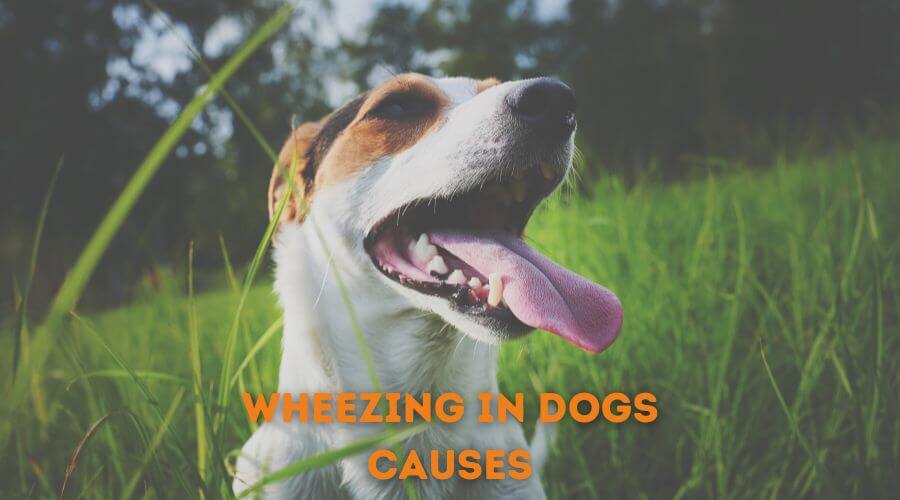| Why Is My Dog Wheezing? |
|---|
| reverse sneezing |
| allergic reactions |
| lung diseases |
| kennel cough |
| heart disease |
| collapsed trachea |
| object stuck in your dog’s tract |
| bronchitis |
| parasites |
| parasites |
| bacterial or viral infection |
What Is Wheezing in Dogs? Overview
Wheezing is a common respiratory symptom in dogs that is characterized by a high-pitched whistling sound when your dog breathes. It is caused by narrowed or obstructed airways and can be due to a number of conditions, including allergies, infections, tumors, and heart disease.
You’re probably constantly asking yourself: why is my dog wheezing? If your dog is wheezing excessively, it is important to consult with your veterinarian to determine the underlying cause and develop a treatment plan. In the meantime, there are a few things you can do to help your dog breathe more easily.
- First, make sure that your dog has access to fresh, clean water at all times.
- Second, try using a humidifier in your home to increase the moisture in the air.
- Finally, avoid using harsh cleaners or aerosol sprays around your dog, as these can irritate the airways and worsen wheezing.
By following these simple tips, you can help your dog feel more comfortable and reduce the severity of their wheezing.
The Most Common Causes of Wheezing in Dogs
Wheezing is a common symptom in dogs that can be caused by a variety of underlying conditions. One of the most common causes of wheezing is reverse sneezing, which is relatively harmless and often resolves on its own. However, other causes of wheezing, such as allergic reactions or lung diseases, can be more serious and require medical treatment.
Kennel cough, for example, is a highly contagious respiratory infection that often leads to wheezing. It’s imperative to speak with your vet if you hear your pup wheezing, so they can identify the cause and provide a successful solution.

Can Wheezing Be a Sign of a More Serious Health Problem in Dogs?
When your canine companion starts to wheeze, it could be an indicator of a serious heart condition. Don’t take any chances – if you notice changes in their breathing, make sure they get seen by the vet as soon as possible and receive necessary treatments for the best outcome!
With proper medical care, most dogs with wheezing can live happy and healthy lives. However, if left untreated, wheezing can lead to more serious complications such as pneumonia or bronchitis. Early diagnosis and treatment are important for the best prognosis.
Be aware of the following concerns when your pooch wheezes in excess:
- allergies;
- kennel cough;
- collapsed trachea;
- an object stuck in your pet’s tract;
- heart disease;
- bronchitis;
- parasites e.g. heartworm;
- tumors;
- bacteria;
- a viral infection.
How Is Wheezing Diagnosed in Dogs?
The first step in diagnosing wheezing is to take a thorough history and perform a physical examination. Your veterinarian will ask about your dog’s medical history, as well as any recent changes in diet or activity level. A stethoscope will be used to listen for wheezing on both inhalation and exhalation. X-rays may also be taken to assess the lungs and heart.
In some cases, airway testing may be necessary to identify the underlying cause of the wheezing. With proper diagnosis and treatment, most dogs can live happy and healthy lives despite this condition. If you’re still asking yourself and others, “why is my dog wheezing?”, it’s time to pay your local vet a visit and check out some treatment options.
Treatment Options for Wheezing in Dogs
Wheezing is a frustrating but often manageable condition for our four-legged friends. While the source of their discomfort can vary, determining what’s causing it quickly is key to finding relief – from soothing antihistamines for allergies to antibiotics or steroids in more serious cases. Working with your vet and taking appropriate action will help ensure that Fido breathes easy once again!
If your pup is wheezing, don’t wait – take them to the vet right away. A diagnosis may reveal they have a heart condition requiring medication for managing it properly. So make sure you get an appointment as soon as possible and ensure that Fluffy gets back on their paws in no time!
Our Reader’s Story
My dog, Max, recently started wheezing and it was really concerning. After taking him to the vet, I learned that he had developed allergies to something in his environment. The vet prescribed him a special diet and some medication to help him breathe easier.
I was surprised to learn that Max’s wheezing was caused by allergies, but it made sense. His symptoms included coughing and sneezing, and the vet said that this was a sign of an allergic reaction. He also suggested that I try to identify the source of Max’s allergies, such as dust, pollen, or certain foods.
I started to make some changes in Max’s environment, like vacuuming more often and washing his bedding regularly. I also switched his food to a hypoallergenic brand and gave him treats that were free of common allergens. After a few weeks, his wheezing had stopped, and he was back to his old self.
It was a relief to know that Max’s wheezing was caused by allergies and not something more serious. Now I know how to help him if it ever happens again.

How Can I Prevent My Dog From Wheezing?
Why is my dog wheezing? If your dog is wheezing, it may be due to an obstruction in the airway. This can be caused by allergies, infection, or anatomic abnormalities. Allergies are the most common cause of wheezing in dogs, and they can be triggered by environmental factors such as dust, pollen, and smoke.
Wheezing can be an indication of infections, anatomic abnormalities, or other underlying medical issues. If your pup is exhibiting this symptom along with fever, coughing and sneezing – see a vet immediately to properly diagnose the cause for appropriate treatment! In the meantime though you could try using a humidifier at home to provide some breathing relief.
Long-Term Effects of Wheezing in Dogs
In most cases, wheezing is not a serious condition and can be effectively managed with medication. However, if left untreated, wheezing can lead to more serious complications such as pneumonia or bronchitis. Spot having trouble catching a breath? It’s always important to get your furry friend checked out by the vet so any breathing issue can be identified and taken care of! With proper medical care, most dogs with wheezing can live happy and healthy lives.
Asthma in Dogs
Asthma is a serious but manageable condition found in many dogs. Symptoms such as coughing, wheezing and difficulty breathing can be difficult to observe until they worsen over time due to irritants like dust, pollen or smoke – which are all capable of triggering the inflammation that causes asthma.
Although it’s not typically life-threatening (with prompt veterinary treatment), owners should take extra care if their canine companion shows signs of an asthmatic episode – proper medical attention may be needed for optimal comfort and quality of life!
Steps to Take When an Unknown Object Get Stuck in Your Dog’s Tract
If your dog is wheezing because he has swallowed an object, there are a few things you can do to try to remove it.
- First, calm down and try to look down your dog’s throat and see if you can spot the object.
- If you can see it, try to gently remove it. If you can’t see the object, or you’re not sure how to remove it safely, don’t try to force it out. Instead, take your dog to the vet so that they can remove it professionally.
- Never remove sharp or dangerous objects from your dog’s tract on your own, as this can cause serious damage or injury.
Why Is My Dog Wheezing? Summary
Your pup’s wheezing can be a sign of something more than just regular respiratory problems. Your vet will conduct an extensive checkup to help pinpoint the cause – whether it’s allergies, heart disease or anything else.
They may also recommend diagnostic testing, such as chest x-rays or blood work. If your dog is wheezing due to an underlying respiratory problem, they may prescribe medication to help relieve the symptoms. However, if the wheezing is caused by an allergic reaction, treatment will focus on identifying and avoiding the allergen. Regardless of the cause, it is important to have your dog evaluated by a veterinarian if they are showing any signs of respiratory distress.
Why is my dog wheezing? We hope we answered your question! Thanks for reading! I hope this article was helpful in understanding why your dog might be wheezing and what you can do about it.
Frequently Asked Questions
How Can I Help My Dog With Wheezing?
Is your pup struggling to take a breath? If so, it is vital that you make an appointment with the vet. Your pet’s doctor could prescribe medication to help alleviate their wheezing and ease inflammation – but they may also suggest some helpful lifestyle shifts such as minimizing allergen or dust exposure through air purification, adding moisture via humidifier use, and supplying stress-reducing activities like walks in nature!
Why Is My Dog Making Weird Breathing Noises?
Your dog may be making weird breathing noises if they are having difficulty breathing. This could be due to a variety of conditions such as allergies, heart disease, respiratory infections, or even heart failure. It is important to take your dog to the vet if you notice any unusual breathing noises.
What Are the Signs of Respiratory Distress in a Dog?
The signs of respiratory distress in a dog may include coughing, wheezing, difficulty breathing, rapid breathing, and open-mouth breathing. Don’t delay professional help – the sooner you get an expert opinion on their health status, the better!
What Are the Signs of Heart Failure in Dogs?
Common signs of heart failure in dogs include coughing, difficulty breathing, decreased energy levels, weight loss, and a swollen abdomen. Other signs may include a decreased appetite, pale gums, and an irregular heart rhythm.
What Are the Symptoms of Kennel Cough?
The most common symptoms of kennel cough are a dry, harsh cough, a runny nose, and sneezing. Other symptoms may include a fever, lethargy, decreased appetite, and eye discharge.
Elizabeth Randolph is a freelance writer and pet enthusiast who has been writing about pets and their care since 2003. She has authored articles on a variety of topics related to pet care, including nutrition, training, health, and behavior. Elizabeth lives in Northern California with her husband and three cats. When she’s not writing, she enjoys hiking and spending time with her family and friends.











